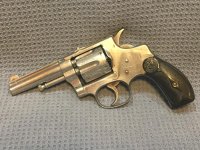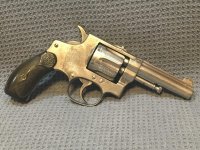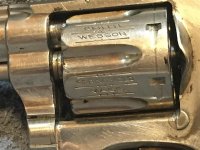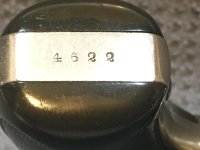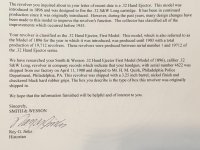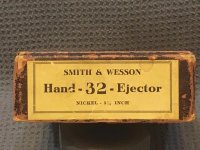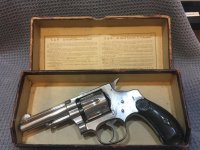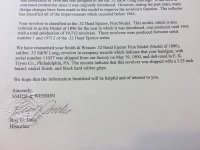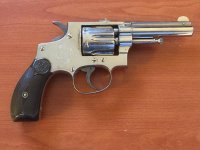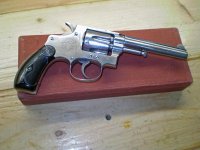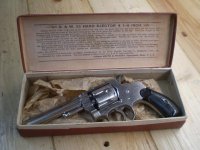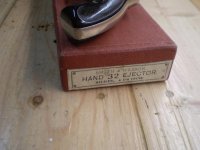With a lot of extra time on my hands, I decided to research an old 32 HE that I've had in the safe for a number of years. I had lettered this gun in March of 2016. It was shipped to Mr. H.M. Quirk of the Philadelphia Police Department on April 11, 1900. I had filed the letter away with out a thought of who Mr Quirk was.
So today, off to GOOGLE land I went and got a nice surprise. The following is a synopsis of information that I found.
Enjoy
Harry M. Quirk was born in Philadelphia on October 29, 1840. After passing through the public schools of the city he was apprenticed to the trade of carpentry, and he learned that trade and worked at it until he enlisted on April 24, 1861, as a private in the 18th Pennsylvania Volunteer Infantry, he saw action in July at the First Bull Run Campaign and was mustered out August 6, 1861. He re-enlisted on September 17, 1861, as sergeant in the 28th Pennsylvania Volunteer Infantry, Company P. Under an order of the War Department he was transferred to the 147th Regiment. At the battle of Chancellorsville, Virginia, on May 3, 1863, a Confederate bullet pierced Quirk's left eye and left him bleeding on the field. He recovered from his wound, but it disabled him for military duty, as the left eye was destroyed by the bullet. He nevertheless returned to his regiment and was commissioned first lieutenant. He remained with his regiment until he was mustered out at Mill Creek, Georgia, in 1864. Returning to Philadelphia, He entered politics and was elected to the House of Representatives for the terms of 1875, 1876, 1877 and 1878. On January 1, 1880, he received the appointment to a clerkship in the office of the Register of Wills. For some time before becoming connected with the police department he held a clerkship in the Philadelphia gas office. On April 1, 1884, Mayor Smith offered him the captaincy of the Third Police Division, and he commanded the division in a manner which gained for him the reputation of being a most efficient commander and a thorough guardian of the citizens' welfare and interests. From 1892 to 1904 Quirk served the city of Philadelphia as the Superintendent of Police until his death, December 5, 1904.
It is often said "if this old gun could talk". Google can make them talk. There are more stories about him, if you want to look him up. He only had this gun for 4 years, it would seem the rest of its history is lost to time.
So today, off to GOOGLE land I went and got a nice surprise. The following is a synopsis of information that I found.
Enjoy
Harry M. Quirk was born in Philadelphia on October 29, 1840. After passing through the public schools of the city he was apprenticed to the trade of carpentry, and he learned that trade and worked at it until he enlisted on April 24, 1861, as a private in the 18th Pennsylvania Volunteer Infantry, he saw action in July at the First Bull Run Campaign and was mustered out August 6, 1861. He re-enlisted on September 17, 1861, as sergeant in the 28th Pennsylvania Volunteer Infantry, Company P. Under an order of the War Department he was transferred to the 147th Regiment. At the battle of Chancellorsville, Virginia, on May 3, 1863, a Confederate bullet pierced Quirk's left eye and left him bleeding on the field. He recovered from his wound, but it disabled him for military duty, as the left eye was destroyed by the bullet. He nevertheless returned to his regiment and was commissioned first lieutenant. He remained with his regiment until he was mustered out at Mill Creek, Georgia, in 1864. Returning to Philadelphia, He entered politics and was elected to the House of Representatives for the terms of 1875, 1876, 1877 and 1878. On January 1, 1880, he received the appointment to a clerkship in the office of the Register of Wills. For some time before becoming connected with the police department he held a clerkship in the Philadelphia gas office. On April 1, 1884, Mayor Smith offered him the captaincy of the Third Police Division, and he commanded the division in a manner which gained for him the reputation of being a most efficient commander and a thorough guardian of the citizens' welfare and interests. From 1892 to 1904 Quirk served the city of Philadelphia as the Superintendent of Police until his death, December 5, 1904.
It is often said "if this old gun could talk". Google can make them talk. There are more stories about him, if you want to look him up. He only had this gun for 4 years, it would seem the rest of its history is lost to time.
Attachments
Last edited:

